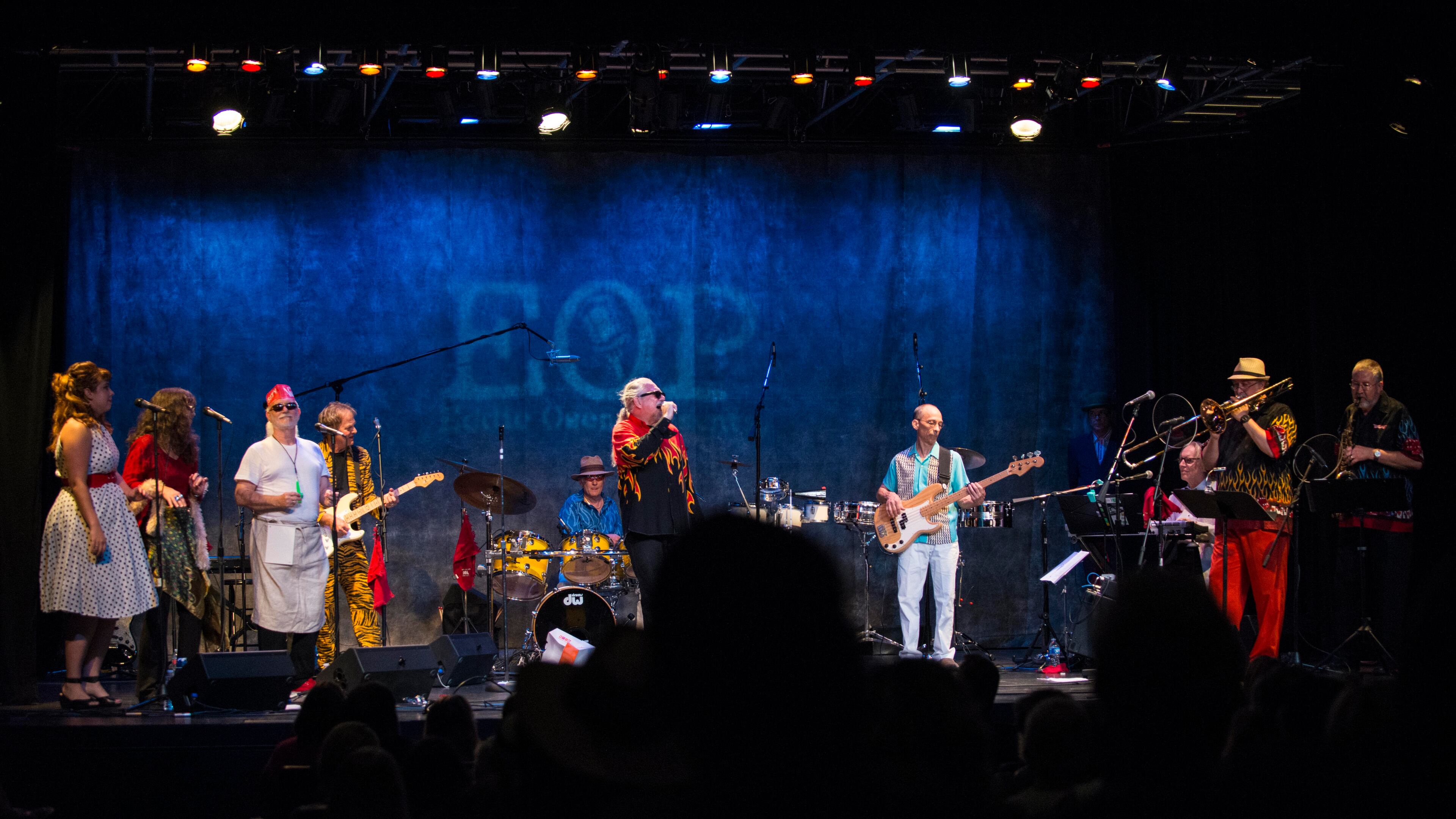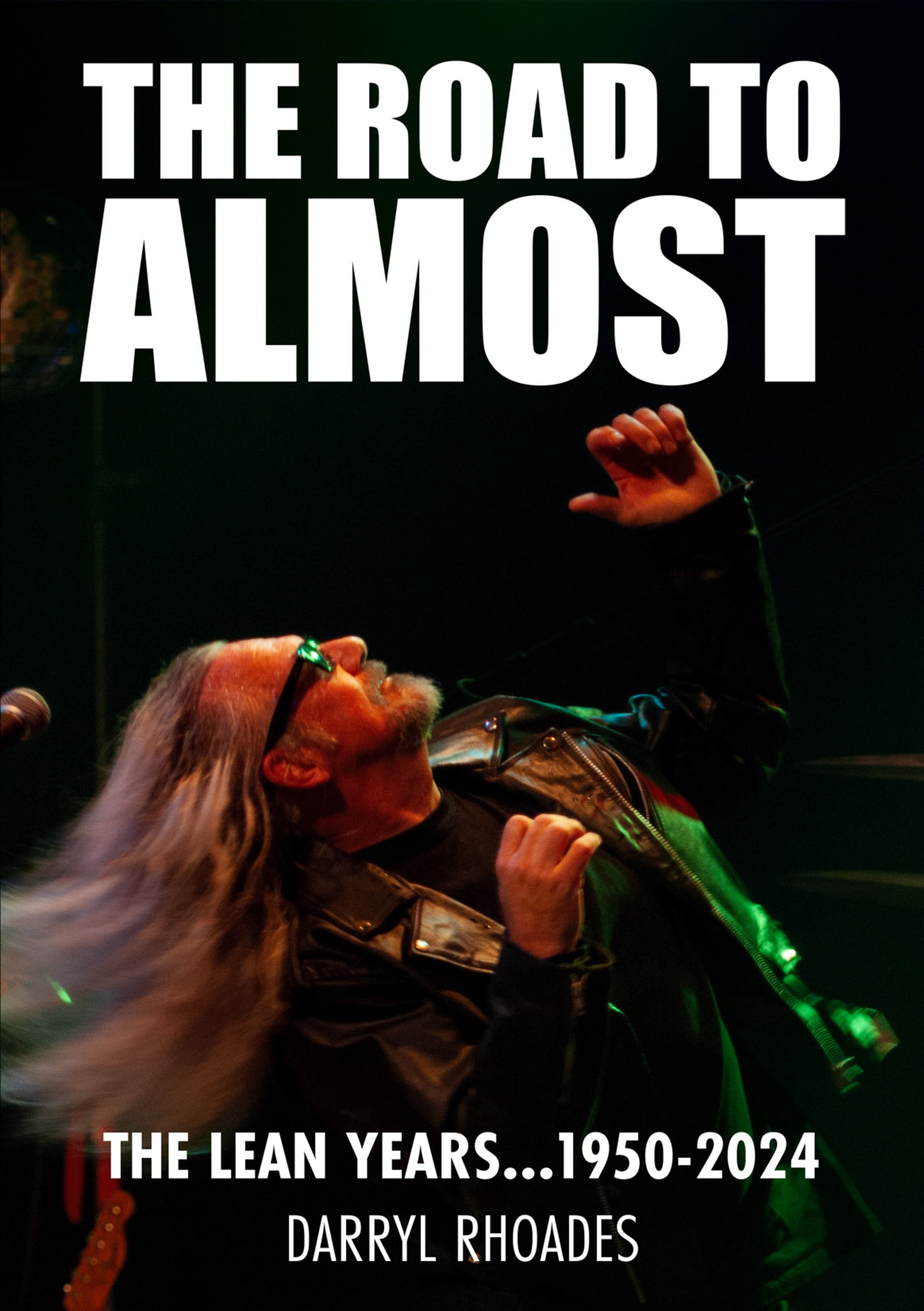Theatrical rocker/comedian Darryl Rhoades recounts life over the edge

It was the winter of 1976 and the Hahavishnu Orchestra was playing inoffensive Christmas music on stage at the Great Southeast Music Hall when a disturbance broke out in the back of the room.
A figure clad in a Santa Claus costume was being hauled into the theater, strapped to a cross made out of two-by-fours. “You’ve got the wrong man!” he screamed, to no avail.
Yes, that was Darryl Rhoades, being crucified for the amusement of his Atlanta fans, while his band played walk-on music.
Rhoades was the one getting nailed in that particular skit, but most of the elaborate set pieces from his 50 years as a performer have been geared toward skewering other likely figures, from money-hungry television evangelists, racist cowboys and gay-bashing politicians to recently released felons reminiscing about prison romance (celebrated in the song “I’m Going Back to the Woman Who Used to Be My Man”).
In one of his most famous sendups, Rhoades sat in with the band Cruis-O-Matic as the opening act for the notorious 1978 show at the Music Hall when the Sex Pistols made their U.S. debut.

Rhoades ridiculed what he considered a no-talent band of posers with a parody song called “Boot in Your Face.” He went on stage seemingly perforated with giant safety pins and a shirt that read “Kill Me,”
Rhoades and Cruis-O-Matic were rewarded with thrown tomatoes and abuse. Village Voice music critic Robert Christgau called Cruis-O-Matic a scatalogical epithet.
But that was just another working day for Rhoades, who took the criticism in stride. “Satire has to have teeth,” he said recently, during a wide-ranging conversation at his house outside Athens.
The 73-year-old Rhoades has had a lot to chew over in his storied career. He has been criticized and lionized, endured years of touring, alternately delighting and outraging audiences around the country. He’s had moderate radio airplay for his hit “Burgers from Heaven,” he’s put out 12 albums without a major label record deal. He began to see significant financial rewards only after he started doing standup comedy.
These adventures are recounted in his self-published memoir, “The Road to Almost,” with the droll subhead: “The Lean Years . . . 1950-2024.”

Despite the self-deprecating title, Rhoades has attained legendary status among Atlanta musicians and audiences. who will likely be surprised by his hardscrabble upbringing.
He grew up in Valley Station, Kentucky, attending a fundamentalist Nazarene church every Sunday. His military father hunted to put food on the table. “As a kid,” Rhoades writes, “I remember him bringing home one of those old metal Coca-Cola coolers full of rabbits, squirrels, groundhogs, raccoons, fish or frogs for Mom to cook and feed the family.”
The family relocated to Forest Park, Georgia, when Darryl was 13, and he was unmoored, lonely and troubled. Drums saved him. “I bashed drums from when I got home from school until my dad came home from work,” he writes.
Music became an obsession. He’d sneak out at night, quietly roll his parent’s car down the hill, and then drive to Midtown Atlanta to soak up the fever dream that was life on the Strip in the 1960s.
One of the book’s delights is a portrait of this era, when Piano Red was a regular at Underground Atlanta (in its first incarnation), Elvin Jones and McCoy Tyner appeared at 12th Gate and the Catacombs featured artists such as Ellen McIlwaine and the Hampton Grease Band.
Rhoades’ first band, the Celestial Voluptuous Banana, became part of that scene, performing at the Atlanta Municipal Auditorium and at Piedmont Park, during the era when the Allman Brothers Band, the Grateful Dead and other bands turned the park into a free festival.
In 1975, after the Bananas split, Rhoades’ new band, still unnamed, performed for the first time at the Lakewood Fairgrounds. It featured about a dozen members, including background singers and dancers dressed in Boy Scout uniforms, maternity clothes, welder’s masks, a Tarzan outfit and evening gowns.
Rhoades writes that he doesn’t remember who came up with the name Hahavishnu Orchestra, a play on John McLaughlin’s fusion group the Mahavishnu Orchestra, but he reports with a certain amount of satisfaction that the famous guitarist was reportedly irritated by the joke.
The band began touring, in two patched-together vans with no air conditioning. Their shows were elaborate, with props, choreography, gorilla costumes and audience interaction.

Rhoades ran around wearing a papier-mâché shark’s head for their Jan and Dean parody, “Surfin’ Shark.” A giant cardboard cutout of Cher joined the stage during their version of “Whipping Post” which included the lyrics, “I’ve been OD’d, I’ve been on speed/And I don’t know why Cher took all of my weed.” The song ended with the memorable kicker, “Good Lord, my whole band is dying.”
In other words, Hahavishnu went right up to the edge, and then sometimes over it. Their Helen Reddy takeoff (“I am woman, hear me b..../Buy my records and make me rich”) won them fans, enemies and national attention. Less well-received was his attack on racists, “Yikes! Here Come the Negroes,” for which he wore homemade Klan robes, earning a reprimand from concert promoter Bill Graham.
Keeping a dozen people on the road is impractical. And sometimes dangerous. When a club owner in Fort Myers, Florida, wouldn’t pay the contracted fee, Rhoades complained and was then threatened with a shotgun.
Honky-tonk gigs on Stewart Avenue helped pay for spare sunglasses. Then came a new band, the Mighty Mighty Men from Glad, and a joint venture with Rev. Billy Wirtz called Midnight in the Garden of Evel Knievel, featuring a guy who nailed his tongue to a two-by-four every night.
Rhoades’ later career as a stand-up comedian was no less dramatic. After a table of rowdies in San Angelo, Texas, heckled his whole routine, he stepped into the audience and knocked the hat off one of the loudmouthed cowboys. Fisticuffs ensued.
Married to Suzanne Deaton, a former flight attendant, Rhoades still performs comedy, but is concentrating on songwriting these days. (He performs Saturday, May 25, at Red Light Cafe, with guitarist Tommy Strain.)
Along with his take-no-prisoners humor, he has an earnest side, reflected in songs such as the environmental lament, “Where Rivers Used to Run.” Attendees at his singer-songwriter shows are treated to both elements. “I would sing {”Rivers”) and a couple of songs later I would do a song about necrophilia, and they stay with me the whole time.”
As his friends began dying off, taken by disease, excess, or suicide, he felt a pressure to tell his story. “I’m lifted up doing this book,” he said, sipping coffee at his breakfast table and wearing his trademark Ray-Ban sunglasses. “This is what I needed to do and I talked about it much longer than I worked on it.” Autographed copies are available through No Big Deal Records.
Rhoades’ stage persona is reflected not at all by his modest, white-painted home in a small town that he’d rather not name. The neatly trimmed front yard, the Delft china on the walls, the framed prints from Egypt: “It’s all Suzanne,” he said of the decorating. “I have no class. It’s all her.” The couple also have a home in Puerto Vallarta, Mexico.
Though his ponytailed hair is now gray, Rhoades has stayed youthful. He credits a lifetime of avoiding almost every temptation of the rock ‘n’ roll lifestyle, abstaining from drugs, excess alcohol and cigarettes while following a vegetarian diet and martial arts training.
His advice on aging? Stop talking about it. “I say this all the time: People who talk about how old they are, your body hears that, and when your body hears that, your body says, ‘Oh well. Here, take this: Start limping.’”
CONCERT PREVIEW
Darryl Rhoades, Tommy Strain and special guests
8 p.m. Saturday, May 25. at Red Light Cafe. $15 advance, $20 at the door. 553 Amsterdam Ave NE, Atlanta. redlightcafe.com



